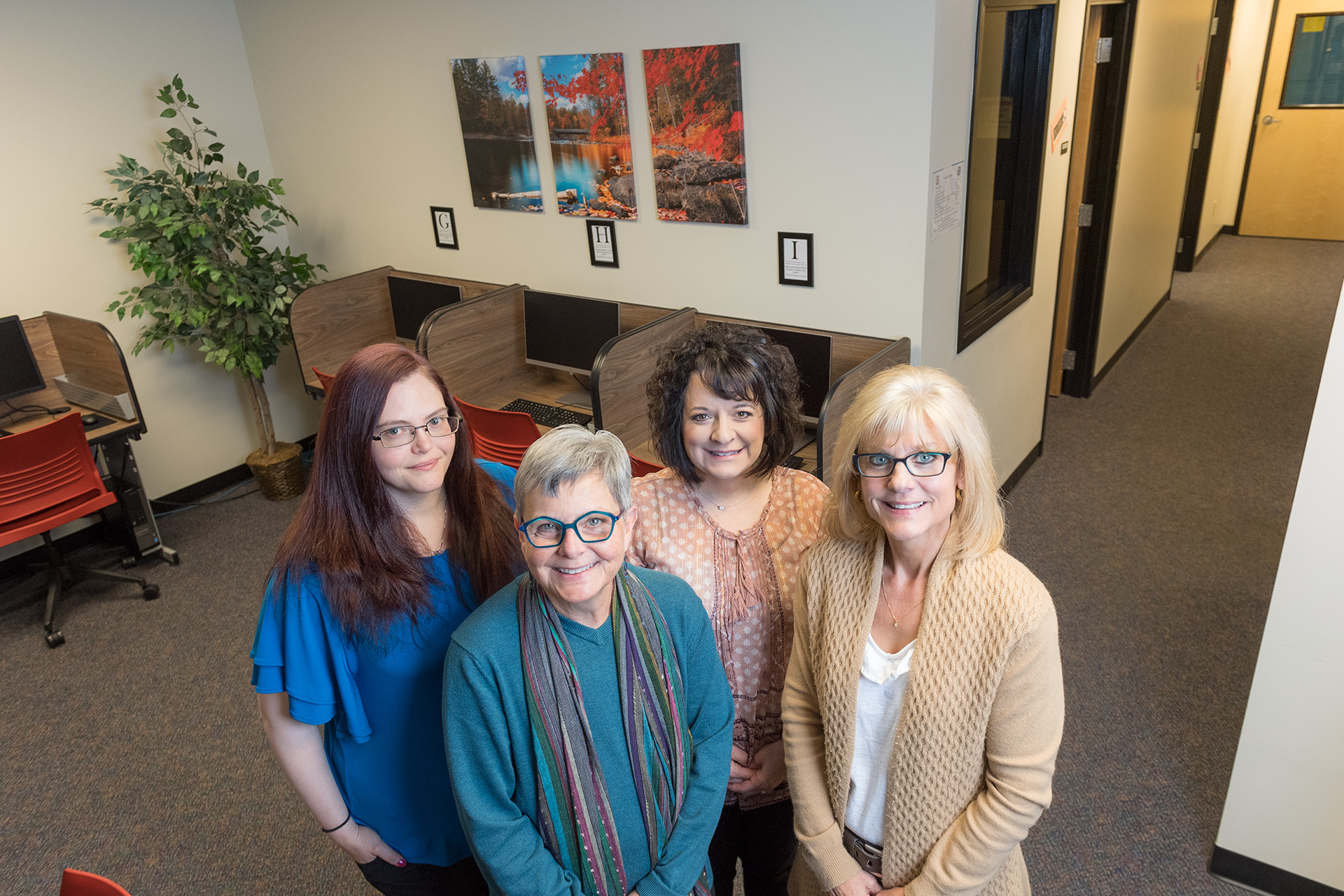
The staff at the Colorado State University Testing Center, left to right, Amanda Farmer, coordinator; Cally Stockton, customer service specialist;
Dawn Bryant, testing center specialist; and Paula Rodriguez, director. Photo by Joe Mendoza, CSU Photography
From contractors and cornerbacks to nontraditional learners and online degree seekers, all students will have to demonstrate what they know at some point. The University Testing Center at Colorado State University strives to make taking exams as convenient as possible, if not entirely stress-free, for a wide range of test-takers.
“We offer a place for student athletes to take tests they might miss while they are traveling to games as well as a place for CSU Online students to take exams,” explained Paula Rodriguez, director of UTC. “We also administer testing for students who receive accommodations through the Student Disability Center, graduate placement exams such as the GRE and GMAT, and a whole range of professional certification and licensing exams for contractors, firefighters, teachers, engineers, even people who apply pesticides as part of their job.”
The UTC is part of The Institute for Learning and Teaching, and has been located in the General Services Building, on the east edge of the main CSU Campus, for the past seven years. With the relocation of the Student Disability Center to the TILT Building on the Oval at the beginning of this school year, UTC has been able to expand into accessible space on the first floor as well as upgrade additional areas on the second floor.
“Now we can offer more space and better equipment in a positive and professional testing environment,” Rodriguez said. “It will really open up availability for students during midterms and finals.”
Better environment for high-stakes exams
Some of the upgrades were made to meet specific testing protocols, such as soundproof rooms for language proficiency exams, carrels with upgraded privacy features, and cloud-based servers that meet high-level security standards. Some, such as improving the center’s phone system and reception area as well as accepting electronic payments, are part of Rodriguez’s focus on exemplary customer service.
“When I came to CSU two years ago, we looked at everything,” she said. “We discovered that the sound of people opening and closing the lockers (to store personal items) was filtering through the air vents and causing a distraction, so we moved them to create a better environment for those taking high-stakes exams.”
UTC is what the university calls an auxiliary unit, which means it is expected to fund its operations through fees and other revenues. To do that, the UTC contracts with commercial testing companies, such as Prometric and Pearson Vue, to offer exams through the CSU facility. The center, a member of the National Collegiate Testing Association, also administers online exams for universities across the country and sends paper tests to locations around the world.
Students in online courses have the proctoring fee included in their tuition cost and other students taking exams in person pay a nominal fee to use the UTC ($5 per 30 minutes).
“Most of our revenues come from the test vendors or outside clients, who include it in their fees, and by charging for the other services we provide,” Rodriguez said.
Big services, small staff
Some of those services include running paper course surveys and answer sheets through Scantron – UTC has added two new scanners to upload results to the Canvas learning system faster – and proctoring challenge exams for course credit.
In 2018, the center administered 3,481 exams for distance, CSU Online and makeup exams and 3,581 professional exams, and scanned a total of 378,213 exams and roughly 220,000 course surveys.
UTC does all this, and more, with just Rodriguez and three employees: Dawn Bryant, testing center specialist; Amanda Farmer, coordinator; and Cally Stockton, customer service specialist. The staff is rounded out by five undergraduate proctors.
To become a proctor, work-study students must undergo an extensive, two-month training in testing protocols, security, interacting with clients and faculty, and other topics, then pass a 90-minute certification exam. Three of the current proctors are graduating in May 2020, so Rodriguez said she is currently recruiting through Student Employment, and she encourages first-year students to apply.
“The job is so much more than sitting watching people take tests,” she said. “Students acquire skills that translate directly into what is required in the job market – it really does combine a number of high-impact educational experiences.”
To learn more about the University Testing Center, go to the TILT website or email Rodriguez at paula.rodriguez@colostate.edu.